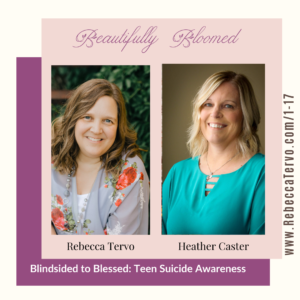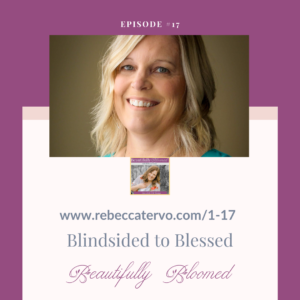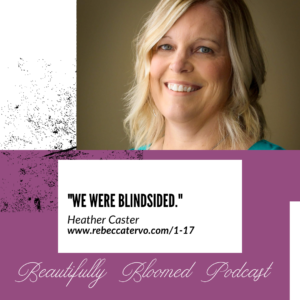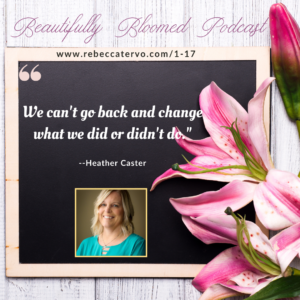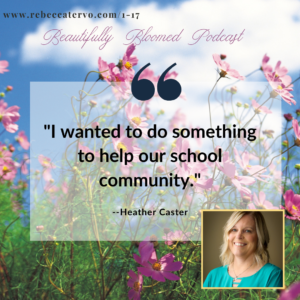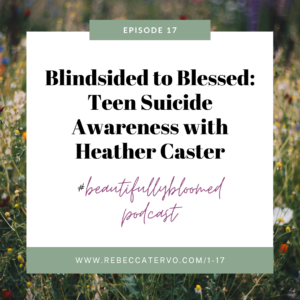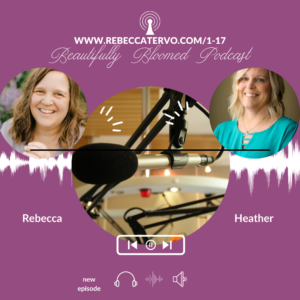Heather Caster is a teacher, consultant and coach in the field of K-8 education. After the death of her daughter, Lauren, to suicide, Heather developed a passion for raising awareness of adolescent mental health and suicide prevention.
With the launch of her new book, Blindsided to Blessed: My Family’s Journey from Teen Suicide to Finding Purpose Heather’s goal is to help other survivors of suicide loss, especially parents, heal and find a purpose. You can reach Heather by email at BeMore020705@gmail.com.
In today’s episode:
- We each have our unique healing journeys after a child’s suicide
- How the campaign “Be More for Someone” was initiated
- The exercise her grief counselor gave her that made a huge impact on her healing
- Why she decided to write a book
You can checkout Heather’s book on Amazon here: https://amzn.to/3t9zvKB
Thank you for listening, and please be aware that our children both died unexpectedly of suicide. The warning signs we thought we were supposed to see didn’t exist, except maybe in hindsight.
Teen suicide is tragic, and a hard loss to heal from. We hope this conversation helps you to think about what your teens are up to, and how you can get more deeply connected to their world.
0:00
As you may or may not know, we lost our 17 year old son unexpectedly to suicide in January of 2012. There will always be a place on my podcast for interviews like today. Today I am welcoming my former client, Heather, who has released her very first book, and I'm so excited to see that her story is going to make such a big impact in the world of teen suicide awareness and mental health.
Heather is a teacher, consultant and coach in the field of K through eight education. After the death of her daughter Lauren to suicide, Heather developed a passion for raising awareness of Adolescent Mental Health and suicide prevention. With the launch of her new book, Heather's goal is to help other survivors of suicide loss, especially parents heal and find a purpose.
0:54
Welcome, Heather, thank you for joining me today on my podcast. Thank you. It's a pleasure to be here. This is my first one ever.
1:03
That's amazing. And I'm happy to have you because you just launched your book recently. Right? Before I get into the book, and before we talk about that, can you tell our listeners like, how did you find out about me first?
In February of 2019, I lost my 14 year old daughter to suicide. And I would say probably a couple of months after that early springtime, I started looking into books that I could read, either, you know, stories such as yours, or even, you know, more technical type books, and I stumbled upon yours first and felt an immediate connection.
1:46
Being from Michigan, that was kind of a big one, too, knowing that, you know, we kind of live in the same area, and just felt that that connection right away. And that was pretty much it. And I joined your email group, and just started getting regular emails from you. And that's kind of how we met as far as that's how I found you. I guess as far as that goes.
Yeah. And what made you decide to work with me? Because then we went on to kind of work together for a while. March of 2020, or February of 2020. Before the big shutdown, I had decided to write a book and wanted to look a little bit more into how I go about doing that. So I emailed you or responded to an email that you had sent. And I guess from there, that that's kind of all she wrote. And we started working together, initially to learn how to self publish a book. And then when you kind of morphed into some more life coaching and that kind of thing. We started working together in a Facebook group for moms who have also lost children to suicide. And from there, it just grew. So yeah, and it's been so fun. I mean, I hate to say fun. Some people would be like, what's fun about like, you know, getting together with other moms who've lost children to suicide. Right. But I guess you and I had totally both reached a level where it wasn't that we were focusing on the grief as much as we were focusing on the healing. Would you agree with that?
3:26
Yeah, absolutely. And I know, I think you were pretty surprised when I told you initially, like it only been a year.
3:34
And then even kind of during that same timeframe, I had spoken with
3:39
an individual from the American Foundation for Suicide Prevention, about maybe getting involved in some things. And same thing, she also was really surprised to hit on me then
3:50
a year, and was just ready to just help and do something more about this cause so yeah, so I. So that's one thing I want to talk to you about, because I read your book right away, I read it within, like I was done in about two and a half hours.
4:09
That was pretty quick. And it was it was just really,
4:13
really great for me to read a different perspective from a mom who lost a child to suicide, just like I had, except that my journey to healing took quite a bit longer than yours. But I think that's a good example of that. We're all different and all of our experiences are different. And the perspectives we come with to that healing are different. So talk to us about like, what was why do you think I guess I'm curious what your thoughts are about why it was for you a little bit quicker, in the way where you just kind of went from, okay, this isn't going to take me out of my life for many years. I'm just going to right now I want to like focus on healing and helping others and like, why do you think
5:00
That happened so quickly for you, or what was that experience about for you and your family? Yeah, I really honestly don't. It's hard to pinpoint one exact thing. I think this has taught me a lot about myself as far as how I do handle grief and trauma. And you know, to be honest,
5:20
this was probably my first real true heart experience with death. I had, I only grew up with one grandparent, and you know, when she passed away, it was a very natural event. And, and so I mean, to be honest, this was really my first time experiencing true grief, and it happened to be of the death of my daughter, which you would think would be the worst ever.
5:46
And so I think, you know, one of the things that, in the very beginning, we had a grief counselor come and meet with all of us that had been involved in the events of the day of her death. And it was the day after the eggs, you know, was less than 24 hours after she had passed. And, you know, one of the exercises that he had us do was to say, if you could have done or said one thing, but it wouldn't have changed the outcome, what would that have been? And I think it has stuck with me this whole time, like, saying and doing and acting on all those things you wish you would have. But she still would have done what she did. I think that was really my first step was just realizing like, we can't go back and change what we did or didn't do. It's not going to bring her back. And I think I've learned for myself that I'm also a very cut and dried person.
6:47
You know, this just is what it is. I can be very emotional. I was torn apart. I grieved very hard for you know, the first month.
6:58
But just kind of knowing like, we have to move on. We also have a soon to be 21 year old daughter in March, and we had to carry on for her.
7:09
Yeah, so I think that's kind of what I've, why I healed so quickly, I guess or I don't say easily.
7:19
Yeah, yeah, I guess that kind of highlights that we are so unique, like all of us, right? And our ability to really, like accept something. I think that's where people find it like that acceptance of that really did happen, because I remember questioning it over and over. And I don't know if you had this experience, but it was like, Did that really happen? And I even came to the point some days of thinking was Trevor even ever in my life, like, you know, your brain does all these tricky, weird things. And it feels so strange, right? Um, but even just questioning, like, did it really happen? Why did it happen? and over and over, like the overlay questioning going around and around and around? Maybe that didn't go on? As long for you as it did for as it does for some other people? Right. And, you know, yeah, and, you know, just two days ago, from this recording this interview was the two year mark. And, you know, I still did find myself thinking and catching myself thinking like, she really is gone. Yeah. And, you know, for me, I can say that, and move on.
8:33
But for my husband and my daughter, sometimes it's not as easy for them to do that. Which is like you said, it's totally fine. I mean, we're all just different. And
8:44
I think I always was that way, even growing up, like my family would kind of joke like, you've got a heart of steel. Like, you know, I wouldn't cry at the Hallmark commercials, and not that it was a bad thing. Just Wow. Like, what, what gets to you, you know, and I've definitely changed as I've gotten older, I mean, becoming a mom and all of that. I mean, I my emotions have definitely changed, but
9:09
That's what I've discovered about myself, I just made a T-shirt for myself the other day that says it is what it is.
9:17
Exactly, it just is, you know, so
9:20
that really reminds me of you having worked with you on your book and stuff, it's like, you are the kind of “It is what it is” person. Like that's kind of that kind of sums it up for you. And that's totally not me as much right? Yes, I got to the place it is what it is. And there's all my emotional stuff attached. Where I like to dig into all the emotions. But that's it's amazing because then I remember the other thing that I thought was so amazing about what you guys were able to do is take a poem that your husband wrote and make it into like a scholarship or a community.
10:00
Talk about that again. Because now I can't remember, like, I don't know how to say it. Like it was a community thing, or it was a scholarship. Thank you for asking about that. Um, so, you know, really, um, I would say within the first Well, the poem was written about 48 hours after she, after she had passed. And so, yeah, he just got up one morning, early, like four o'clock in the morning and just went in the bathroom and started writing this poem out. We were staying at my sister's house
10:32
at the time, because her suicide had her attempted happened in our house in our house. So we weren't comfortable, obviously, being there right away. So. And yeah, it was just the most beautiful poem. It's in my book, and, and that really kind of inspired everything. So we just knew, like, I knew right away that I wanted to, to help the the bigger picture of suicide prevention and awareness. But then I also wanted to do something for our school community.
11:02
You know, I'm a teacher in our school district where Lauren went to school.
11:07
I was actually teaching in the middle school when her suicide happened. My sister's a teacher in the district, our parents worked in the district, we graduated in the district. So this is our home. And this is our, this is our village. And that's what I say in the book as well. So we wanted to do some sort of scholarship.
11:27
And so we, you know, we kind of just did some reading and talking to people we knew that, like, the scholarship couldn't necessarily be in her name, but we kinda had to be careful with how, who it was associated with, I guess, is what we should say. So yeah, yeah. So the scholarship will be based on like, how, how the students live, live that poem, basically. So if the poem is “Be More for Someone”, and that's the biggest thing that they really are going to have to prove is, you know, how is that poem impacted their life. And so the first group to receive the scholarship will be the class of 2023, which would have been Lauren's graduating class. So yeah, I love that idea. I mean, it's nice to come to notice the different ideas of what people have to help with, you know, suicide prevention and awareness and how that comes into your life because, like, my husband went through QPR and stuff, but I never felt this pole or draw, to really focus on the Suicide Prevention part. But I think when you have this something like a poem that just comes through, it sounds to me like it just came through your husband in a time of great suffering and pain, and like, what a beautiful thing to come from that. Right. And so to have that inspiration to offer something like that, it's just, yeah, that was really I was really inspired and touched by that when you told me about that poem. And is it just so like, wow, and then, you know, we when we look back, like, well, what could have we done, you know, how always makes you feel like, you should have done something and, and then you're like, Well, you know, what, we're already doing the work we wanted to, but, um, I love that, that you guys found that and so it I hope it gives other parents thoughts about like, especially parents who've already who've lost children. Thoughts about like, what could you do? To help out students and teenagers, right. It's the toughest time in life. I feel like being a teenager, what a hard time. And after we lost Trevor to suicide, it, it just became more apparent to me that, wow, these teenagers go through so much. And maybe there's more support needed? Or maybe there's an I don't know what that is, but so that be more be more for someone kind of talks about that right, supporting each other and feel like that's kind of what it's about. Right? Yeah, yeah. I mean, you know, a couple of lines are,
14:00
if someone appears to be lonely, the more engaged with them.
14:06
If someone wants to tell you about something they enjoy, the more eager to listen to them. So you know, just yeah. And I, you know, the way Michael explained, it was just he felt like it was more in speaking through him, like, exactly what needs to happen. You know, and to be honest, I mean, she could have been saying that to her father, and I like, yeah, like, do this, you know, to her sister. I mean, yeah. It kind of does apply to adults, but it definitely is a message that we want kids to hear as well. So yeah. And that in that interesting thing you said about being so careful. This is I think a thing a lot of parents struggle with after their child dies by suicide, especially if your child was in high school, which well, yours was in middle school school and Ryan was in high school, right? So especially if they were in school, let's just say that not college, but like you know, high school or middle school.
15:00
Well, and one thing we tend to struggle with is the idea that oh, well, we shouldn't talk about it or, you know, if it was so weird. The school doesn't want you to talk, like, the kids want to talk about it. But the school doesn't want you to say it out loud. And it just became this weird thing where we felt like that was a real block to our healing tool. Right? We had a hard time healing, because, I mean, I felt like there was something there. And now maybe, and so our loss was about nine years ago, right? Yours was about seven years ago. No, two years, yours was two ours was nine. That's where the seven comes from.
15:40
I can do math. I'm thinking maybe times are shifting a little bit. You know, maybe there's been, you know, I think it's, maybe there's more awareness now than there was, right, nine years ago, but it felt like such a, like, we shouldn't say anything, like it's gonna happen, you know, and that kind of felt weird and icky to us. Like, how do you support parents who've lost a child when you can't talk about it? Or how do you even support the friends at school and the students in their class? Right, when you're not supposed to talk about it?
Was Lauren able to be in the yearbook that year? Because Trevor was taken out of the yearbook. Yeah, like that. When you Jamie? I'm like, that breaks my heart. I mean, do you know, I mean, gosh,
16:33
I mean, we were actually able to put her school picture, like a bigger picture in the back. I think it was just a smaller one. But we could include Michael’s poem. I know, like, That's what I'm saying. Like, it felt to me, like, let's just erase and pretend he didn't exist in his class, which, so there's a lot of things that we had a lot of issues with that I feel like when those kind of things are happening in the community or in the school, that's where I think that road to healing gets tougher, right? Because you there's just more hurdles now. Like, it's just harder. So it's important for other parents to be aware of this, like, how can we help support that healing?
17:20
And that's, I guess, initially why I became a grief coach for suicide losses. Like there's just not a lot of people out there doing this work, or, you know, in this specific area who have been through it. It's such a different type of thing, right? Yeah. So, talk to us a little bit about your book, like, how did you make the decision? You wanted to write a book? Like, yeah, I mean, honestly, I mean, I remember pretty distinctly, like, I think I was actually still at my sister's house. And we were there for about two weeks. And I remember saying, this story has to be told, like it, meaning that
18:02
just like my book says, blindsided, like, that's the first time that's the first word in the title. And that's literally what we were. I mean, it came out of absolute nowhere. Totally, totally coming completely. Um, and so I kind of knew that this has to be done. I don't know when, you know, I don't know how or when, or where, but, um, yeah, and and so that's kind of how it started. And,
18:31
and I think, you know, Michaels poem, also, we definitely knew that we wanted to get a broader audience, but we didn't really know how, like, it's one column, you know, and so it got spread, you know, word of mouth, and via Facebook and email to like people that we knew. But I knew that if I wrote a book, it could go in there. And that could be a premise for
18:55
how we've healed So, you know, that's definitely a part of it, about how the book came about. But yeah, I mean, that was pretty much it. I kind of knew, like, right away. And then, like I said, at the beginning, one of your emails just spoke to me. And I thought, now's the time. So
19:15
that's really how I got started, at least Yeah, yeah. Yeah. And it's, you and I have had the same experience where we had no idea that our children were even considering suicide. Like, there was nothing. There were no signs that we knew of there was no nothing, none of that. There were no warnings. Nobody knew, really. And I think I had the idea that wouldn't. I mean, I had no idea that there was suicide that would even come into my life. Like I was so far removed from that thought.
19:47
I guess what I would have thought about it is like, Well, you know, there are people that are depressed or they've had issues in the past or something bad happened in their life. That's what I thought about suicide before. You know, it happens
20:00
To us, right after I was like, wow, there's a lot of people that die by suicide where there aren't any. Right. The actual, you know, the list of signs, right? I mean, the list of signs to look for, like, what those didn't apply to us, either. I mean, I just feel like there's something to be said, for people to be aware that it's not this thing, you know, because I had questions. Did you have questions about that too, from other people? Well, what did you miss? And what, you know, what was it? I don't know, if you had those? We had a lot of those kinds of questions. Yeah. I mean, not really. To be honest, we didn't have a lot of that. I mean, you know, our, our people closest to us. I mean, we would tell them right away.
20:43
No clue. And, you know, one of my best friends that's mentioned in the book, but she said, you know, Lauren, hit it well. And she did. She really did. You know, in hindsight, we can look back at that list of signs. And I can think, well, maybe we saw that, but you know, everything that we look back on, at the time, we chalked it up to she's a teenage girl. You know, I mean, the lots of time in the bedroom or the moodiness or whatever. I mean,
21:18
who, you know, who doesn't? Who doesn't see that in their teenage children? So, um, you know, and then And finally, you know, looking through her phone and seeing some different things we know, we saw.
21:31
I mean, obviously, in the book, the whole thing that started it was finding a vape device.
21:37
And that one, too, like, what, where did that come from? And so that risky behavior sign?
21:45
You know, looking back, yeah, we see that now. But we didn't know about it at the time. We didn't know about the risky behavior at the time. So yeah, so interesting. Yeah. But I don't think we know a lot about what's going on with our kids. We think we do. Sure, we really don't. Sometimes there's and there's nothing we can do to go back and fix that. Right. Yeah. So this. So actually, I want to tell people where they can find your book.
22:15
It's on Amazon. Right? So that's just yeah, it's available. Yeah. Yeah, it's available in ebook and paperback right now on Amazon. Yeah. So the title is blindsided to blast my family's journey from Teen teen suicide to finding a purpose. It's a long one.
22:33
And then soon to be an audio book, I guess maybe in the next month or so.
22:38
That's being produced right now, as well. So exciting. And so the other thing I like to talk about before we wrap up our conversation is you were also one of my clients, and we studied some Human Design together. And so the last thing I always love to ask everybody on my show is like, what, one or two things did you learn about yourself that helped when you learned about your human Human Design? Which your manifesting generator just like I am, right, right, like, you know, what were some of the things that you found helpful. Um, you know, I think one of them that I saw that was out, kind of like, I'll be committed and like, 100% into something if I can feel it in my heart, and I know that it's the right fit for me. And I think actually, like, honestly, think before meeting you, but also before losing Lauren, I don't know if I actually would have done that. I think I said yes, a lot to things. Because I felt like I should. Yeah, I think now. Yeah, I think now I've kind of learned like, no, like, if it's not something I feel very strongly about. I'm not necessarily going to do it or at least not right away. So that's one thing that I think has been big, for me huge, right? Like the overcommitting that we do with our manifesting generator energy because we have a lot of energy, right? People know we have a lot and they're like, Hey, can you do this for me? He does that for me. We're like, yes, yes, yes, yes. And then we just burn ourselves out, and I feel exhausted, right? And exactly, that's what I learned to him, like, Oh, I totally can see this pattern I had
24:22
people if I call it kind of people pleasing in some ways, it's like, yeah, we want to be liked and all that stuff, right? Like, I want people to like me. So of course I want to help out and but knowing that actually, I could help people better when I'm totally committed to it myself, right, and when my energy is lit up, and that's what that manifesting generator energy is about. Let's light ourselves up with our energy and feel good about what we're working in. So that's great, thank you for sharing that point. That's a great point about
24:54
what we can learn from our own human design. So thank you so much other so
25:00
Where can people find you besides going to Amazon? Where would you like people to go look for you if they want to learn more about your book? And about what you're up to? Yeah, so right now, I'm not really on anything else, I don't have an author page or anything. I'm on Facebook. Um, so you know, it's not necessarily public, but they can find me there or message me, you know, through there.
25:21
And I actually, with your suggestion, I need to link my book right on my Facebook page. So I will be sure to do that after this call.
25:29
So that's pretty much it right now. And then on my Amazon page, in the author page, like through Amazon, and also in my book, there is an email. Oh, good. It's been or 020 five@gmail.com. Yeah, people could email me that way and reach out that way as well. Yeah, because what I know, being a mom to who wrote a book who lost a son to suicide, people are gonna want to contact you. So, be open for those other parents to reach out. I think it is great that we have a network that we can share, we can share our ideas and our stories, and we're not alone, just so you're free, or their parents are not alone. So Absolutely. Thank you so much for being here. Welcome. really a great conversation. Thanks. Thank you.
26:19
If you enjoyed listening to this podcast, please go subscribe so that you get notified of all the future goodies that are coming along. While you're there. Please leave me a review and let me know what you think. So excited to share this with you and can't wait to talk to you next time. Bye.
